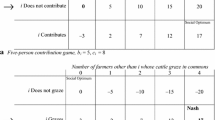Abstract
This paper examines the possibility of endogenous determination of intra-group sharing rules in a collective-group rent-seeking game. Collective-group rent-seeking is considered as a two-stage Nash-Cournot game in which sharing rules are determined prior to individual decision on voluntary contribution. The solution is subgame perfect and is obtained by backward induction. In competition between two groups of the same size, the Nash equilibrium sharing rule of each group is to distribute rent to each according to relative effort. Total rent-seeking outlays in this case are equal to those obtained by Tullock (1980). When more than two groups compete for a rent, the sharing rule based on relative effort is again likely to be the Nash equilibrium strategy of each group. The amount of total rent-seeking outlays is also equal to that in Tullock (1980). In a nutshell, the rent is substantially dissipated if sharing rules are endogenously determined.
Similar content being viewed by others
References
Allard, R.J. (1988). Rent-seeking with non-identical players.Public Choice 57: 3–14.
Appelbaum, E. and Katz, E. (1987). Seeking rents by setting rents: The political economy of rent seeking.Economic Journal 97: 685–699.
Baik, K.H. (1994). Winner-help-loser group formation in rent-seeking contests. Economics and Politics, forthcoming.
Brander, J.A. and Spencer, B.J. (1985). Export subsidies and international market share rivalry.Journal of International Economics 18: 83–100.
Corcoran, W.J. and Karels, G.V. (1985). Rent-seeking behavior in the long run.Public Choice 46: 227–246.
Hillman, A.L. (1989).The political economy of protection. London: Harwood Academic Publishers.
Hillman, A.L. and Katz, E. (1984). Risk-averse rent seekers and the social cost of monopoly power.Economic Journal 94: 104–110.
Hillman, A.L. and Riley, J.G. (1989). Politically contestable rents and transfers.Economics and Politics 1: 17–39.
Katz, E., Nitzan, S. and Rosenberg, J. (1990). Rent-seeking for pure public goods.Public Choice 65: 49–60.
Krueger, A.O. (1974). The political economy of rent-seeking society.American Economic Review 64: 291–303.
Lee, S. (1990). International equity markets and trade policy.Journal of International Economics 29: 173–184.
Lee, S. (1992). Optimal rent-seeking group.American Economist 36: 58–60.
Lee, S. (1993). Inter-group competition for a pure private rent.Quarterly Review of Economics and Finance 33: 261–266.
Leininger, W. and Yang, C.-L. (1993). Dynamic rent-seeking games.Games and Economic Behavior, forthcoming.
Long, N.V. and Vousden, N. (1987). Risk averse rent-seeking with shared rents.Economic Journal 97: 971–985.
Nitzan, S. (1991a). Rent-seeking with non-identical sharing rules.Public Choice 71: 43–50.
Nitzan, S. (1991b). Collective rent dissipation.Economic Journal 101: 1522–1534.
Posner, R.A. (1975). The social costs of monopoly and regulation.Journal of Political Economy 83: 807–827.
Tollison, R.D. (1982). Rent-seeking: A Survey.Kyklos 35: 525–602.
Tullock, G. (1967). The welfare costs of tariffs, monopolies and theft.Western Economic Journal 5: 224–232.
Tullock, G. (1980). Efficient rent seeking. In J.M. Buchanan, R.D. Tollison and G. Tullock (Eds.),Towards a theory of the rent-seeking society, 97–112. College Station: Texas A&M University Press.
Ursprung, H.W. (1990). Public goods, rent dissipation, and candidate competition.Economics and Politics 2: 115–132.
Author information
Authors and Affiliations
Additional information
I wish to thank Gordon Tullock, Kyung Hwan Baik, Wolfgang Leininger, Shmuel Nitzan and an anonymous referee for their valuable comments, help and suggestions. Any remaining errors are my own responsibility.
Rights and permissions
About this article
Cite this article
Lee, S. Endogenous sharing rules in collective-group rent-seeking. Public Choice 85, 31–44 (1995). https://doi.org/10.1007/BF01047900
Accepted:
Issue Date:
DOI: https://doi.org/10.1007/BF01047900



